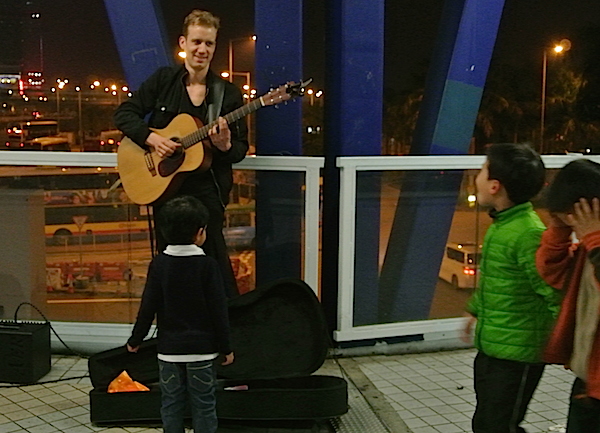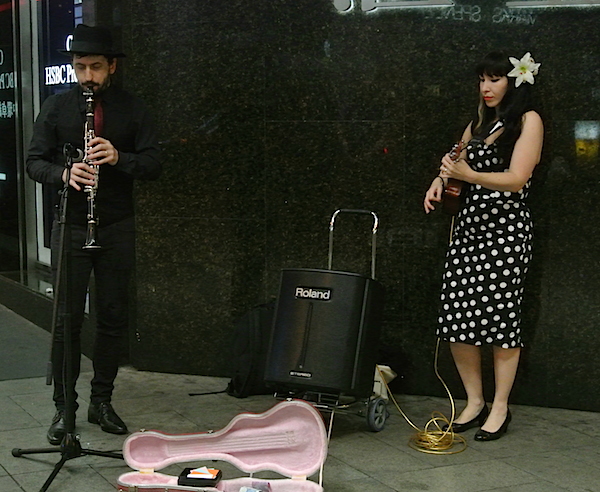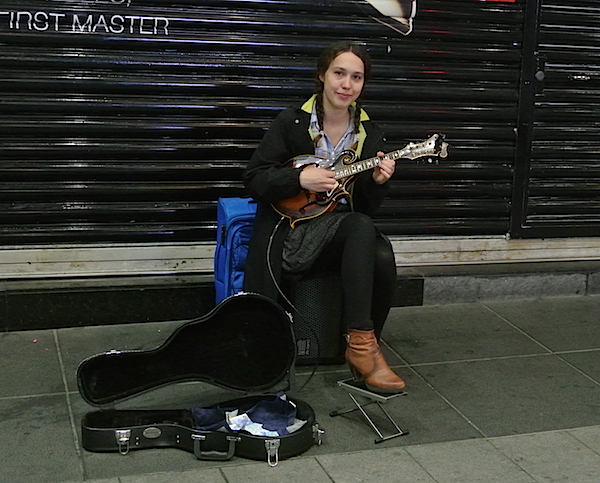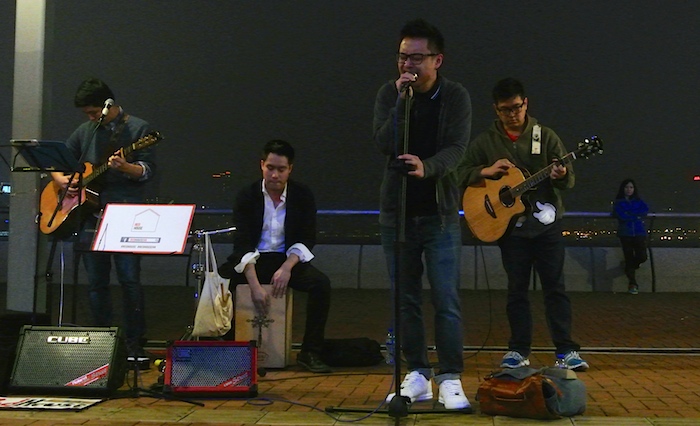Artists are not required to apply for a permit to busk, nor is there any real regulation of performers. However, last year, pedestrianisation of the street was limited to weekends and public holidays.
Are the arts being stifled, or are Hong Kong’s buskers simply casting a wider net and setting up shop elsewhere? Can you really limit creativity within the confines of 9-5?
You only need walk around a single block across the harbour to find that this simply isn’t the case.
Tobias Sebastien

(Kid on the right isn’t too impressed)
“I live in London but was born and raised in Germany, and I’m here visiting my friend. Busking here, it’s less of a hustle and you’re pretty much allowed to do it. I busked on Great George Street in London once…that was not a good idea.”
Tobias is your quintessential European street performer. His music is a breath of fresh air along the walkway from Star Ferry to Central among the suffocating sea of people.
But Tobias makes catching the attention of the crowds look easy. Children line up swaying to the rhythm of his acoustic guitar. He smiles and focuses all his attention on his most adoring fans.
“I’ve been busking in Central, around this pier, and in Tsim Sha Tsui. I haven’t tried Mong Kok. It’s only allowed on Saturdays and Sundays and those crowds, they are super crowds. [Mong Kok is] not for me.”
Headclowns

“We’ve been doing this since 2011. We started in Mong Kok on Sai Yeung Choi Street, but haven’t been in a while. It’s really noisy. We’re semi-acoustic, so that doesn’t really work for us. We love that place and that area but it’s really hard to hear ourselves”.
The Headclowns live, breathe and sleep music. Busking is an essential component of this. Day and night, they perform music, teach music and engross themselves in a love of the art. When performing outdoors – whether on yacht, at a wedding or on the street – the Headclowns are in their element.
“It’s a kind of alternative lifestyle. I know a lot of people who are bankers during the week and they [busk] on the weekend for fun. We’re not like that. This is actually part of our income, believe it or not. We are freelancers. You don’t get any sick leave, any paid leave. We have to make it pay”.
The line between street art and begging is a blurred one in the minds of many Hongkongers. However, with the busking scene growing in the city, this mindset seems to be slowly changing, resulting in a growing respect for street performers.
While appreciation from the general public might be growing, however, this has yet to stop attempts by the authorities to control busking outside of Sai Yeung Choi Street.
“Well, the police are the police. For a policeman, it offends, regardless of what the laws are. They have a certain idea of what we are: travellers, or illegals. Sometimes I have to remind them (in Cantonese) that it is legal and we are allowed to do it.
Often what they’ll do is cite one reason – like a noise complaint – and we’ll say, ok tell us all the details because they should have all that. Then they go ‘uh, in that case then it’s obstruction’. They can try and get creative about it.”
Sonya First

Sonya sits on the corner of Theatre Lane, her hair in braids, a smile on her face, and a mandolin in her hands – hardly a common sight in Hong Kong.
She is midway through her travels, taking her delicate melodies across the globe. A citizen of the world, Sonya claims she is from neither here nor there, but in fact, a little bit of everywhere.
“I’ve been in Hong Kong since October and been busking pretty much since then. I’ll probably stay here one more month and then I’ll go to the mainland. I graduated last year and after that I just wanted to take some time off so I’ve been busking around.
I do some other music projects as well – recording, writing. If you come out to a place like this and you don’t have any friends, it’s not that easy to meet new people. Busking changes that.”
Red House

“Me and the guitarist were roommates at university. At first we didn’t really know each other. He was playing guitar, so we jammed together. Some people just finish their college and go and work. They lose their interests and hobbies, and we didn’t want that.”
Red House play music for music’s sake. Band member Keith is an electronic engineer by day, and busker by night. They gained their third member and current drummer and guitarist after he saw them busking one night.
They can most often be found at the Star Ferry pier in Tsim Sha Tsui, but frequent the other side of the harbour too. Of Sai Yeung Choi Street, Keith says it’s just too busy, and people are less likely to stop and listen.
“Our name? We decided to play outside at the amphitheatre and we were just talking. We thought, maybe one day we’d be famous enough to hold a concert at the Coliseum – in Cantonese, it translates roughly to ‘Red House’.”
While fame may have been something Red House initially sought, it’s now only about the enjoyment derived from the performance itself.
“Fame, it’s not something I really desire. In 2007, I came second place in the EEG singing contest and I signed a ten-year record deal. After a year I didn’t get a singing job and no recording time to produce an album, so I went to college and left the contract. I will let it happen by luck if it happens now.”








